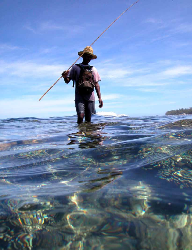Press Release – Regional strategy for adaptation to climate change for the western Indian Ocean islands


July 9, 2012
IOC’s high-level workshop leads to the validation of a regional strategy for adaptation to climate change for the western Indian Ocean islands.
Multi-sectoral officials and other stakeholders (UNDP, EU, NGOs…) from the Indian Ocean Commission’s (IOC) five Member States – Comoros, Madagascar, Reunion (France), Mauritius and Seychelles – met in Mauritius on 4th and 5th July 2012, for a two-day regional workshop organized by the IOC’s Acclimate Project, to validate a regional strategy for adaptation to climate change.
Officials and experts from the IOC’s Member States worked together to finalise the principles and objectives of the strategy, and to identify priority sectors for the western Indian Ocean islands such as integrated water management, environment (terrestrial and marine), public health and food security. They also agreed on other priority sectors – disaster risk reduction, transports energy, tourism, etc. – which must be taken into consideration at a later stage.
Participant’s expectations, expressed over the course of the workshop, helped clarify the roles and phases necessary for the implementation of this strategy. All Members were in agreement on the need to set up a regional climate service centre, in line with the recommendations of the World Meteorological Organisation (WMO) within its Global Framework for Climate Services (GFCS). With support from several resource centres, this regional centre would enable the pooling of expertise to strengthen the IOC’s Member State’s resilience to climate change.
The finalized strategy has now to be approved by the IOC’s Ministerial Council before the end of the year. The intention being that this strategy becomes IOC’s framework for regional action in terms of adaptation to climate change in the coming years.
(0) Comments
There is no content